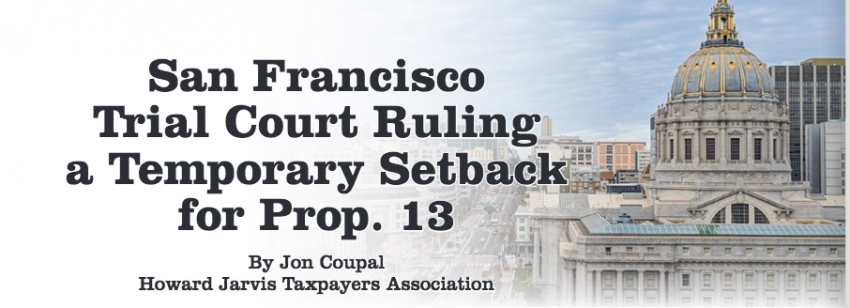San Francisco Trial Court Ruling a Temporary Setback for Prop. 13
by Jon Coupal

Recently, a San Francisco judge upheld the validity of a local special tax that failed to secure a two-thirds vote of the city electorate as required both by Proposition 13 (1978) and Proposition 218 (1996), also known as the Right to Vote on Taxes Act. Both initiatives were sponsored by the Howard Jarvis Taxpayers Association. The lawsuit was brought by HJTA and, after the ruling, it immediately filed an appeal.
The harmful consequences of the court’s ruling cannot be understated. Unless reversed on appeal, a gaping new loophole will have been created in the Constitutional protections for taxpayers that voters have repeatedly ratified over the decades. Moreover, the decision is a green light to tax-and-spend interests to extract even more dollars from the most heavily taxed citizens in the United States.
By way of background, in June of 2018, 50.87% of San Francisco voters voted affirmatively for Proposition C, a tax on commercial rents. There is no dispute that the tax, projected to raise $145 million annually, was intended for the specific purposes of providing child care, early education, and salary increases for preschool teachers in the City of San Francisco.
The less than fifty-one percent of the vote doesn’t cut it. Proposition 13, approved by California voters in 1978, requires a two-thirds vote of the electorate to pass a tax increase for any special purpose. This has been the law for 40 years. It has also been the consistent position of interests often hostile to taxpayer rights. The Legislative Analyst’s Office, California League of Cities, and numerous other local governments have agreed that all local special taxes require two-thirds voter consent.
The basis for the court’s strange ruling, unfortunately, had its genesis in an earlier California Supreme Court case in 2017. But that case, California Cannabis Coalition v. City of Upland, had nothing to do with vote thresholds. Rather, it was limited to a narrow technical question: When a local initiative seeks to impose a new tax, does the measure need to be put to the voters at the next general election or can the proponents, relying on other laws, require a special election that happens sooner? The lower court had ruled that taxes proposed by initiative are exempt from the taxpayer protections contained in the state constitution, such as the provision dictating the timing of the election. But Upland never addressed the issue of whether the requirement for a two-thirds vote would not apply if the tax increase was proposed by initiative.
The Supreme Court in Upland reasoned that local voters were different from the governing body when it comes to enacting legislation. But for decades courts have said that when voters use the initiative power they are simply “stepping into the shoes” of the governing body and have the same powers and same limitations. For example, a local city council cannot seize someone’s real property without paying “just compensation.” The reasoning of the court suggests that if local housing advocates propose an initiative to seize someone’s property, there’s no requirement to pay for it. That is surely an absurd result.
Unless reversed on appeal, the ruling of the trial judge in the Measure C case will create a bizarre system whereby different vote thresholds – including no vote at all – will depend on whether a tax was proposed by the local governing body or by the initiative process. Abuses from this system are obvious. Now, when the politicians themselves use the citizens’ initiative process, they can ignore the requirement of two-thirds voter consent.
Another abuse that will surely manifest itself is that public agencies will collude with outside interests to propose taxes in the form of an initiative, then submitt a tax under a lower vote threshold than that currently required. The worst-case scenario would be if a local government were to rely on Upland as legal authority to impose a tax without any election at all.
The legal fight over taxes imposed in violation of the two-thirds vote requirement was predicted by HJTA immediately after the Upland case was decided. The Measure C lawsuit is just one such case. Another Measure C (also from San Francisco, which appeared on the later June ballot), also involves a special tax that failed to achieve a two-thirds vote. That tax is being contested by HJTA and others. And a third case has been filed in Fresno where, once again, HJTA lawyers are defending the two-thirds vote mandate.
The Supreme Court has caused unnecessary confusion with its ruling in Upland that, regrettably, has necessitated several lawsuits being filed to enforce taxpayer rights. Ultimately, the Supreme Court will have to provide clarity, one way or another. And if it is against taxpayers, another statewide measure in the mold of Prop. 13 will surely be on the table.
Jon Coupal is president of the Howard Jarvis Taxpayers Association.




